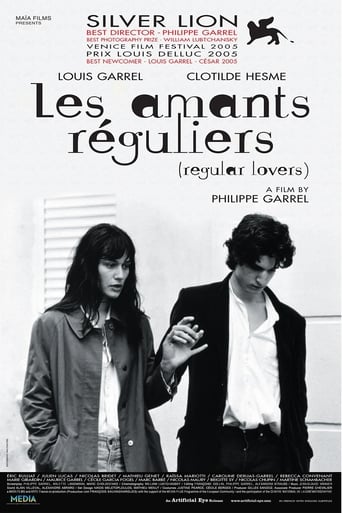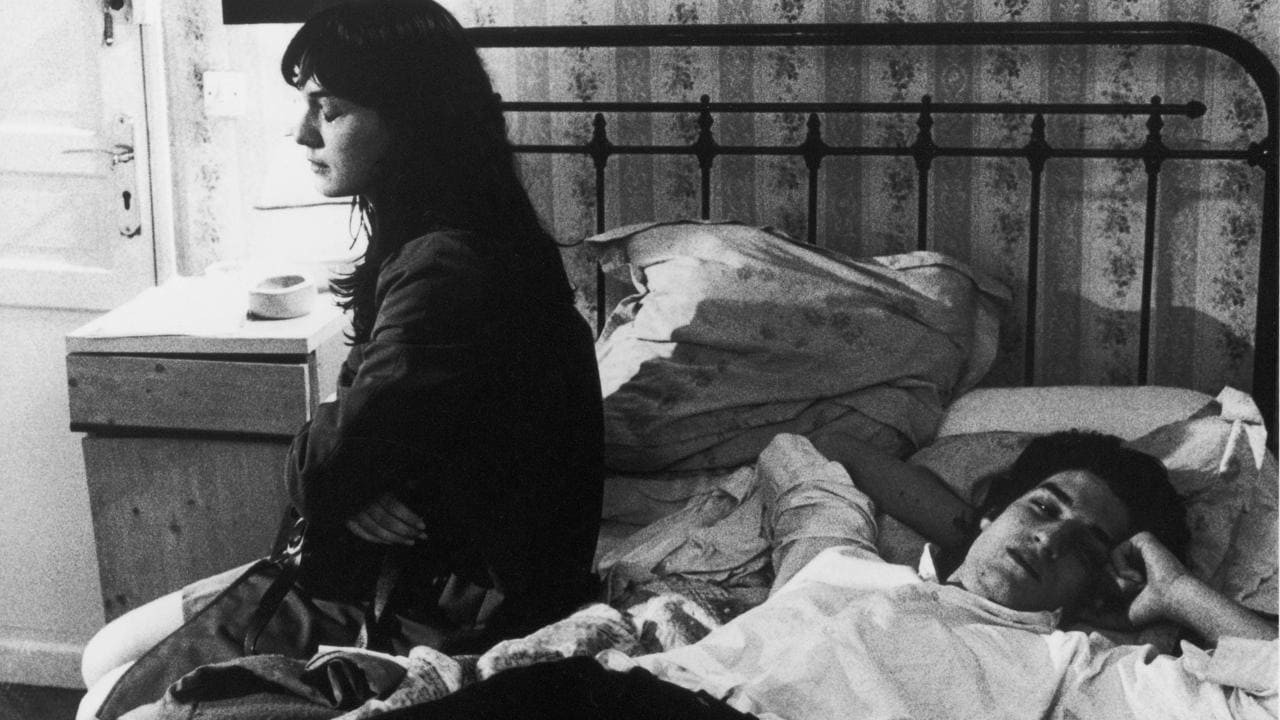susanaferenc
It's not like an historical movie, it's not a movie with unforgettable love stories, it's not a movie with a spectacular scenario, but i can surely say it's a movie with a great atmosphere...It had that 60's kind of bohemian and rebellious spirit: a group of friends living in a poor apartment in Paris, each one making art, dreaming of changing the world, doing drugs and loving in his very own way.It takes a lot of patience to watch, and a special mood, that if you're not in, you might find it extremely boring and dull.I liked a lot the very realistic approach of the events that took place and their immediate effect on student's lives: the fear for their future, the difficulty of earning their living, the obstacles in following their dreams.What i absolutely loved was the black & white image. The still camera angles were amazing, they were like freezing moments. It left me the impression of a long slide show of old and very emotive and suggestive photographs. I actually had to see the movie again, just to take those amazing screen-shots.In one word: beautiful...
dromasca
Seeing Les Amants Reguliers calls immediately for comparison with Bertolucci's movie 'The Dreamers', in my opinion the best film made about the 1968 revolt of students in Paris. Actually director Philippe Garrel does not seem to avoid comparing with his much more famous colleague, sharing the principal actor and even including a direct replica eye-in-viewer-eye about an older film of Bertolucci. And yet, LAR is a different film, and an interesting one.The story line seems also familiar. The movie starts with long scenes of the 1968 'emeutes', maybe among the best done until now. The film is made in black-and-white, and the perspective of the static camera on one side or the other of the barricade reminds Eisenstein. Then, as in The Dreamers, the action moves in the Parisian flat where the heroes of the defeated revolt make art, smoke drugs, dream, and fall for one other. There is no direct social comment, no real explanation of the background of the revolt. The movie focuses on the psychology of the characters and on the love story between the main characters. It's like a premonition of the process of transition to the establishment that the generation of the 1968 went through, it's just that not all the participants may adapt or survive.The film is more about the characters than about the events. And it is merely for the style it will be remembered about. The black-and-white cinema is memorable not only in the revolution scenes, but also when looking at the characters evolution. Many sequences are enhanced by a technique that is derived from the silent films movies, with long takes accompanied by a off piano tune. The effect is exquisite. Yet the length of the film is hardly justified, it lasts more than three hours and I doubt that cutting it to only two hours would have been a miss - actually I am convinced it's quite a contrary.Without raising at the depth and subtlety of Bertolucci's movie LAR is another perspective to remember about one of the more important years in the history of France and of the world in the 20th century.
Paul Martin
This is one of many films I have seen at the Melbourne French Film Festival 2006. I average 100 films a year on the big screen and this is only the third film I have ever walked out on (after 75 minutes).Yes, it looks absolutely beautiful. Cinematography and lighting are great. The characters all look authentic and you'd swear you were watching a film made 30 or more years ago. It looks like a piece of art, but for me cinema is all about telling a story. And that's where this film falls apart - all style and no substance.There is no story, nothing compelling. It was so laborious to watch and a struggle to stay awake. There was little to differentiate this film from just looking at a book of old European photography (and that's not what I go to a cinema for, as much as I love photography). I felt that if it was like this after 75 minutes, how can I sit here for 3 hours! Obviously many others felt the same way because about 10% of the audience left before us. The only other time that I have seen a walkout like this was with The Aristocrats. This film was a wasted opportunity.
Lasse Jensen
This film is probably the best new French film I've seen in this century so far. There have been some great ones including Noe's Irreversible, Green's Le Pont des Arts and Hadzihalilovic's Innocencebut none of them come close to Les Amants Reguliers' timeless glory.The movie is a description of the events of May 68 and what followed in the wake of it and furthermore it is and update of, and a homage to, the Nouvelle Vague-movies of those days. Concerning the depiction of the riots in Paris the movie is meticulously accurate (I'm only 19 and I wasn't there myself but you know what I mean)and the almost real-time and very long riot scenes set the stage perfectly for the aftermath of the events in the streets of Paris. The riots are not glorified or beautifully photographed like the ones in Bertolucci's The Dreamers (to which the movie is comparable in many ways) instead they are filmed in grimy black and white shots courtesy of the excellent William Lubtchansky. The love story that is the movie's main concern after the riots in 68 is filmed in stunning and far less blurred shots and manages to evoke true feelings of love and adolescent confusion in the midst of the otherwise politically concerned and seemingly cold environment.This film is a beautiful love story and it radiates through it that the director wants to depict his own experiences of those mythical late 60's which makes the film all the more compelling. But the film is also a homage to the whole Nouvelle Vague canon. Much of the dialogue evokes early Truffaut, and the length and non-action and plot less structure is reminiscent of Eustache or Rivette. There are even Godard-like verfremdung-effects with the persons looking directly into the camera and even addressing Bernardo Bertolucci directly. This film is no doubt an answer song to Bertolucci's The Dreamers and it is also a Nouvelle Vague homage but still it stands by itself as a beautiful and radiant love story.Bottom line: This movie is incredible and if you love French cinema you shouldn't sleep on it. It may be the finest french film since Eustache's La Mamain et la Putain.


 AD
AD


